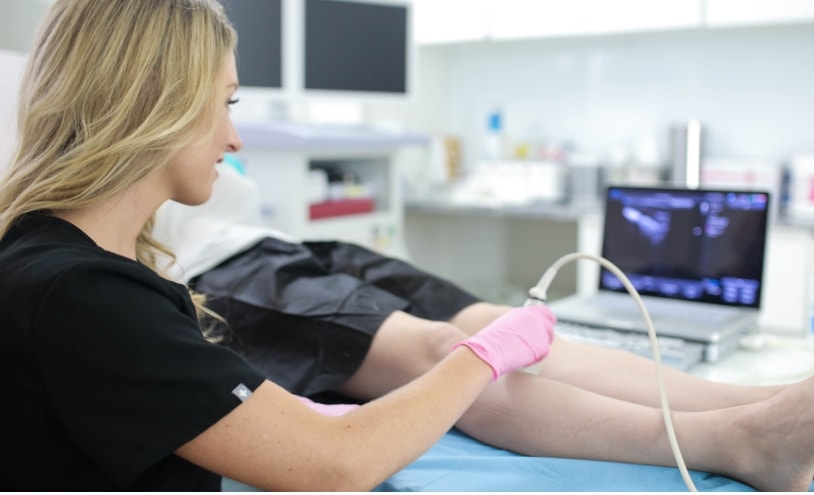Which doctor is best for varicose veins?
If you’re suffering from varicose veins and spider veins, you might wonder which doctor to contact. Patients with spider veins and varicose veins usually contact their internal medicine doctors or dermatologists. But you should ideally contact phlebologists, i.e., vein doctors, vein specialists, vein physicians, vein experts, or vascular doctors. Phlebologists are medical professionals with specialized training in the prevention, diagnosis, and treatment of vascular conditions, such as spider veins, varicose veins, and chronic venous insufficiency.

Some dermatologists may also offer spider vein and varicose vein treatments, but they can only address the cosmetic components of your vein problems. Most patients pursue varicose vein treatments to improve the appearance of their skin. But varicose veins aren’t a skin problem — they’re a vascular problem. Varicose veins are essentially damaged blood vessels with excessive blood accumulation, which leads to vascular dilation and the external appearance of varicose veins. Dermatologists don’t have the training to address the root cause of spider veins and varicose veins.
Phlebologists or vein doctors, however, undergo specialized training to diagnose and treat spider veins, varicose veins, and the root cause of all vein problems. Furthermore, you should also look for board-certified vascular surgeons who have undergone a certification process from the American Board of Venous and Lymphatic Medicine. You must find board-certified and fellowship-trained vein doctors who offer comprehensive vein care and minimally invasive spider vein and varicose vein treatments.

Vein Treatment Clinic is led by board-certified vein specialists with years of advanced training in vascular imaging and minimally invasive procedures. We always diagnose and treat the root cause of your vein problems to ensure safe and long-lasting relief from vein problems. We have state-of-the-art spider vein and varicose vein treatment clinics in New York, New Jersey, California, and Washington DC. You can find our vein clinic in the National Capital Region at 10215 Fernwood Rd, Suite 301, Bethesda, Maryland.
Please schedule an appointment to meet with some of the best vein doctors today.
What is the main cause of varicose veins?
Chronic venous insufficiency is the primary root cause of varicose veins. Chronic venous insufficiency is a circulatory disorder caused by the collapse of vein valves — the components that ensure one-way blood circulation to the heart against the force of gravity. When your vein valves malfunction or collapse, blood flows backward and accumulates in the leg veins, eventually leading to vascular dilation and the formation of spider veins and varicose veins.
Can varicose veins go away naturally?
Varicose veins can’t go away naturally. Since varicose veins are the result of the collapse of vein valves, the only way to treat varicose veins permanently is to address the root cause. If you don’t seek medical treatment, blood will continue accumulating in the leg veins, leading to increased vascular dilation and the formation of new varicose veins. The existing varicose veins may dilate even more, leading to a higher risk of burst varicose veins.
Furthermore, natural home remedies like apple cider vinegar and witch hazel can’t treat varicose veins because they can’t fix the diseased vein. Once the vein valves collapse, there’s no way to fix them, so there’s no way to treat varicose veins using natural methods. The only way to treat varicose veins and the underlying vein disease is through minimally invasive procedures, such as radiofrequency ablation, endovenous laser ablation, venaseal, and ambulatory phlebectomy.
How can I stop varicose veins from getting worse?
If you want to prevent varicose veins from worsening, you need to minimize the accumulation of blood in leg veins and alleviate the pressure in your legs. You need to implement lifestyle changes that improve blood circulation and push some of the accumulated blood towards the heart. Doing so won’t treat varicose veins or the underlying root cause, but it will prevent the condition from worsening and offer temporary relief from discomfort.
The following lifestyle changes can prevent varicose veins from worsening:
- Wear compression stockings to push the accumulated blood towards the heart
- Elevate your legs above your heart’s level while sitting down
- Don’t sit or stand still for long periods of time
- Exercise regularly — running, swimming, and cycling are ideal
What happens if varicose veins are left untreated?
If varicose veins are left untreated, blood will continue accumulating in the leg veins, and your condition will continue worsening. The continued accumulation of blood in leg veins may lead to excessive vascular dilation and weaken the vein walls. Over time, the varicose veins may burst and cause profuse bleeding, for which you have to be taken to an emergency room. You may also experience the advanced complications of untreated vein disease, such as leg ulcers, skin discoloration, and deep vein thrombosis.
Can varicose veins cause death?
In rare cases, varicose veins can be fatal. While varicose veins aren’t deathly in and of themselves, the underlying vein disease can eventually lead to blood clots in the leg veins (deep vein thrombosis). If the blood clots break, they may travel to the lungs and lead to a potentially fatal pulmonary embolism. As such, varicose veins don’t cause death, but the root cause of varicose veins can be fatal in extremely rare situations.
What is the newest treatment for varicose veins?
VenaSeal is one of the newest minimally invasive treatments for varicose veins. It received FDA approval for the treatment of varicose veins and chronic venous insufficiency in 2015. During VenaSeal, the vein doctor injects a medical adhesive into the diseased saphenous vein to seal its walls shut, turning it into a hardened tissue eventually metabolized by the body. The accumulated blood reroutes into healthier leg veins and restores optimal blood circulation to the heart.







